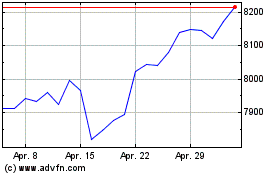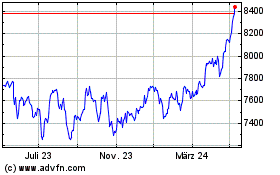By Gunjan Banerji and Will Horner
Stocks around the world continued a sharp slump Friday as fresh
economic data and the viral outbreak in China fanned worries about
global growth.
Anxiety swept through stocks, bonds and metals markets as
investors dumped equities and reached for traditionally safer
assets like Treasurys and gold.
The Dow Jones Industrial Average dropped 508 points, or 1.8%, as
losses accelerated midday. The S&P 500 lost 1.5%, and the
tech-heavy Nasdaq Composite fell 1.2%.
Market volatility flared up throughout the week, with major U.S.
indexes logging big swings both up and down. The S&P 500 had
been on one of its longest stretches without a move of more than 1%
since 1969, before the calm shattered to start the week. In a
dramatic reversal, the broad stock market gauge is on track to
record three such moves over the past five days.
The record run for major indexes, earlier propelled by easing
trade tensions between the U.S. and China and a strengthening
domestic economy, came to a halt. Stock markets in Europe and Asia
finished their worst months since August.
"We alleviate one area of uncertainty and we get two more in its
place," said Adam Phillips, director of portfolio strategy at
wealth management firm E.P. Wealth Advisors.
Mr. Phillips said he has been advising clients to brace for
choppy waters ahead in the stock market. "It could get worse before
it gets better," he said.
The potential effects of the coronavirus darkened the outlook at
a time when many investors had been encouraged by progress on trade
between two of the biggest world economies, along with three
interest rate cuts by the Federal Reserve.
In the bond market, the yield on the benchmark 10-year U.S.
Treasury note edged back below the yield of the three-month bill.
The phenomenon, known as a yield-curve inversion, is often
interpreted as a warning sign about a recession ahead.
The World Health Organization on Thursday declared the
coronavirus -- which has now sickened more than 9,500 people and
killed over 200 -- a public-health emergency of international
concern. Although the move highlighted the risk the outbreak posed
globally, the WHO stopped short of recommending restrictions on
travel or trade. Meanwhile, the U.S. saw its first person-to-person
transmission of the virus, escalating concerns about its
spread.
The growing contagion has roiled markets in recent days as
investors attempt to assess whether the virus could weigh on
China's economy as businesses are shut, borders closed and flights
suspended, while also gauging the outbreak's wider impact.
The outbreak comes as some big manufacturers have exhibited
signs of strain, raising other concerns about the economy.
Caterpillar, often considered a bellwether for the economy, said
Friday it expects demand for its machinery to fall this year,
citing global economic uncertainty that crimped sales in the latest
quarter. Its shares dropped 2.5% Friday.
Boeing earlier this week reported its first annual loss in more
than two decades, as one of its aircraft has been grounded
world-wide. And 3M is planning layoffs during a global
restructuring.
Meanwhile, new data Friday showed that business activity
faltered. One measure, the Chicago Business Barometer, fell to its
lowest point in about four years, hitting 42.9 and falling well
below expectations. Readings under 50 indicate activity is
contracting.
"It's a disappointing number," said Chris Zaccarelli, chief
investment officer for Independent Advisor Alliance. "It's been a
tale of two economies."
Although manufacturing data has disappointed recently, the U.S.
consumer continues to spend, giving comfort that the decadelong
economic expansion could continue.
The University of Michigan's headline index of consumer
sentiment hit an eight-month high.
Fresh data released Friday showed household spending rose a
seasonally adjusted 0.3% in December from November. Personal income
advanced 0.2% last month. The spending figures were in line with
economists' expectations, while the personal income number fell
short of expectations.
The rocky week for major indexes has been marked by even more
explosive moves in individual stocks. The sharply divergent
fortunes of some corners of the stock market was on stark display.
As manufacturing heavyweights delivered lackluster news, some tech
highflyers outperformed the market, soaring to unprecedented
heights.
Amazon.com jumped 8.6% after the e-commerce giant's
fourth-quarter sales set a record for the holiday period. It is
poised to become the fourth U.S. company to close with a $1
trillion market value and close at a record.
Tesla's stock continued to soar after the electric-car maker
reported its third consecutive quarter of record vehicle
deliveries. Its shares jumped 10% Thursday though they edged lower
Friday.
International Business Machines rose about 4.5% after the
technology company said Chief Executive Ginni Rometty is stepping
down following a challenging eight-year run.
"There was a belief going into earnings season that expectations
of tech companies were so high that whatever happened, investors
would be disappointed," said Mr. Kreckel. "That hasn't
happened."
Elsewhere, new data on major European economies proved to be a
disappointment on Friday. France's output shrank in the fourth
quarter as strikes and protests against the government's pension
plan curtailed business activity. Italy's economy also contracted
in the latest quarter, when economists had been expecting output to
remain flat. The euro area also grew more slowly than economists
had forecast.
The pan-continental Stoxx Europe 600 gauge fell about 1.2% this
month, its biggest one-month decline since August 2019. The U.K.'s
FTSE 100 index just finished its worst week since October 2018
after the country reported its first two cases of the virus.
The weaker-than-expected European data suggests that any boost
to gross-domestic-product growth will take longer to materialize,
said Brian O'Reilly, head of investment strategy at the
Dublin-based Mediolanum International Funds.
"There was definitely a sense of euphoria that was priced into
the market," Mr. O'Reilly said. "But we are not expecting a rebound
in global GDP at least until the middle of this year. We think it
will just take time for confidence to build."
Stocks in Asia were mixed. The Hang Seng Index had its worst
month since August 2019 and exchanges in China remained shut.
The number of people sickened by the new coronavirus in China
now exceeds the global total infected with severe acute respiratory
syndrome, or SARS, which killed nearly 800 people after emerging
from southern China in late 2002 and spreading into 2003.
Write to Gunjan Banerji at Gunjan.Banerji@wsj.com and Will
Horner at William.Horner@wsj.com
(END) Dow Jones Newswires
January 31, 2020 13:43 ET (18:43 GMT)
Copyright (c) 2020 Dow Jones & Company, Inc.
FTSE 100
Index Chart
Von Mär 2024 bis Apr 2024

FTSE 100
Index Chart
Von Apr 2023 bis Apr 2024
